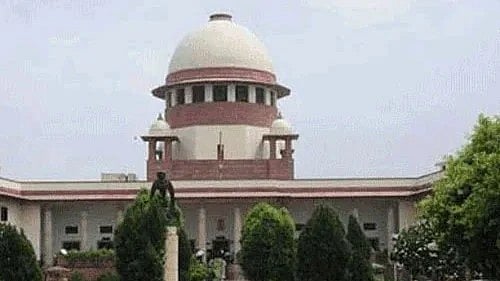
The Supreme Court of India
Credit: PTI Photo
New Delhi: The Supreme Court on Tuesday referred to the Constitution bench to examine if judicial officers selected in subordinate judicial services after seven years practice as advocate can also apply for direct recruitment to the post of district judges only open for the experienced Bar members.
A bench led by Chief Justice of India B R Gavai also asked the Constitution bench to determine whether the eligibility for appointment as a district judge is to be seen only at the time of appointment or at the time of application or both.
The bench also comprising Justices K Vinod Chandran and N V Anjaria passed the order on a batch of petitions seeking reconsideration of February 19, 2020 judgment in the case of Dheeraj Mor vs Hon’ble High Court of Delhi (2020).
A three judges bench had then held that the members of the judicial service of a State could be appointed as district judges either by way of promotion or the limited departmental competitive examination. The court had then ruled that under Article 233(2) of the Constitution, an advocate or pleader with seven years of practice could be appointed as district judge by way of direct recruitment, in case he is not already in the judicial service of the Union or a State.
The court had then also declared that the rules framed by the High Court debarring judicial officers from staking their claim as against the posts reserved for direct recruitment from Bar would not be ultra vires to the Constitution.
The plea filed by Rejanish K V and others contended even those judicial officers who have an experience of seven years at the Bar prior to their joining as judicial officers would be entitled to be appointed as district judges via direct recruitment.
The petitioners sought a reference to the Constitution bench.
Agreeing to their plea, the bench noted Article 145(3) of the Constitution provided that any case involving a substantial question of law as to the interpretation of the Constitution should be placed before the Constitution bench of minimum five judges.
The court observed the previous case in view of the question involving interpretation of Article 233(2) ought to have been placed before a bench of five judges.
"However, it appears that the same was placed before the bench of three judges and the judgment was delivered. We are, therefore, of the considered view that the issues involved in the present batch of petitions ought to have been decided by a Constitution bench of not less than five judges,'' the bench said.
